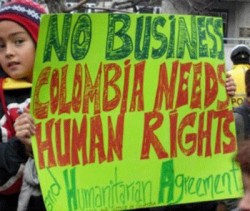
Colombia FTA protest
What brought Jose Hugo Yanini and other Colombian unionists to Washington is a simple demand that the U.S. simply not continue to do business with a country where speaking out for labor rights can be a death sentence.
Beyond labor issues, Colombia suffers from a whole range of crises: a monstrous drug war, ongoing factional conflicts, and deep marginalization of Afro-Colombian and indigenous communities. All of these problems are interlocked in a climate of impunity and corruption, which is symbolized by Colombia’s distinction as labor murder capital of the world.
For the unionists struggling for survival, an imbalanced trade deal would further compound the power imbalance in Colombia’s labor system, where the price a worker pays for raising his voice is meted out in blood.
